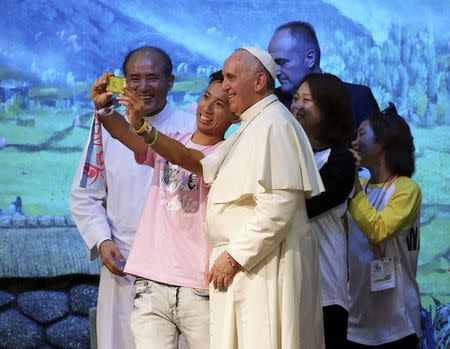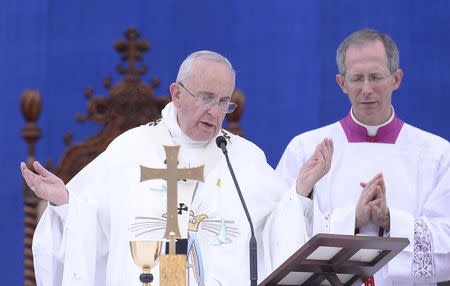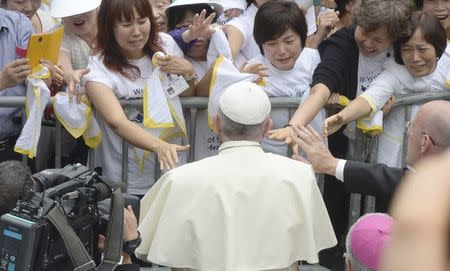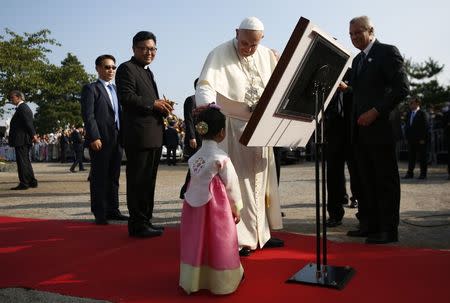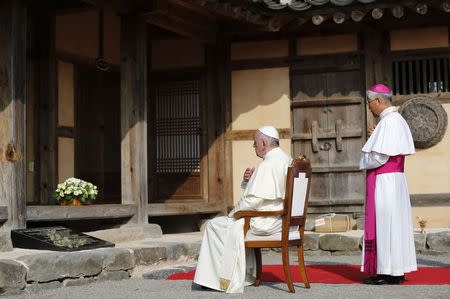Pope, departing from script, leads prayer for Korean unity
By Philip Pullella and Ju-min Park SOLMOE South Korea (Reuters) - Pope Francis on Friday urged Koreans to pray and work for the re-unification of their divided peninsula, departing from his prepared text to say they should aim to reunite as one family "with no victors or vanquished". The impromptu remarks were the pope's most specific comments on the division of Korea since starting his first trip to Asia on Thursday, and were made in response to a question by a girl at a boisterous youth rally. At the rally on Friday, Francis also condemned the "idolatry of wealth, power and pleasure" he said was spreading a spiritual desert across the affluent world. Earlier, he led prayers for the victims, survivors and families of the Sewol ferry disaster. The 1950-1953 Korean war ended in an armed truce that leaves North Korea and South Korea in a technical state of war. "Let us pray for our brothers in the north," the pope said, leading the young people in prayer. "Lord, we are one family. Help us reach unity. You can do it. So that there are no victors or vanquished. Just one family, only brothers." Francis began his impromptu remarks in English and then switched to Italian, asking a priest to translate for him, before returning to his prepared text. Earlier, a girl at the event in Solmoe, site of a shrine to Korea's first priest, had asked the pope what she could do about the divided country. "You are brothers who speak the same language ... think of your brothers in the north. They speak the same language and when, in a family, the same language is spoken, there is a human hope," he told the gathering, urging them to "not despair". North Korea turned down an invitation from the South Korean Catholic church for members of its state-run Korean Catholic Association to attend a papal mass on Monday in Seoul, citing the start of joint U.S.-South Korean military drills, due to begin on the same day. Shortly before the pope's arrival in Seoul on Thursday, the North fired three rockets into the sea, although on Friday it said the timing of the event had nothing to do with the pope's five-day visit to the South. Like many young people in South Korea, Lee Bo-min, a 20-year social welfare student at the rally, said she had not previously given much thought to the issue of Korean reunification. "As the pope said, we speak one language. We are one people and family. I may have been too indifferent ... I should pray more for peace for South and North Korea." WEALTH AND INEQUALITY At the rally in Solmoe, where thousands of cheering young people gave the pope an ecstatic welcome, Francis warned of a "spiritual desert beginning to spread throughout the world," as the gap between the rich and poor widened in many places. While outwardly successful and home to some of the world's biggest companies, such as Samsung Electronics Co Ltd <005930.KS> and Hyundai Motor Co <005380.KS>, South Korean society has become more unequal as its economy has grown. South Korea is now the 29th richest country in the world in terms of gross domestic product per person, but many of the graduates its universities churn out each year struggle to find decent jobs, settling for lower-paying temporary work. While parents spend thousands of dollars on private tuition to give their children an academic edge, nearly half of elderly South Koreans are impoverished, the highest such rate among the 30 members of the Organization for Economic Cooperation and Development. Francis made an apparent reference to the polarization caused by income inequality at his Mass earlier in the day in the central city of Daejeon, when he urged listeners to "reject inhumane economic models which create new forms of poverty and marginalize workers". He traveled by high-speed train to Daejeon, where he urged his audience to "combat the allure of a materialism that stifles authentic spiritual and cultural values and the spirit of unbridled competition which generates selfishness and strife". In Daejeon, he met families of victims and some survivors of the Sewol ferry tragedy before saying Mass in front of about 50,000 people at the World Cup stadium, where he wore a yellow ribbon, the symbol of tribute for the ferry victims. Hundreds of trees in the city were decked with yellow ribbons in remembrance of the more than 300 people, mostly school children, who died when the South Korean ferry, structurally defective and heavily overloaded, capsized and sank on a routine journey on April 16. At the end of the Mass, Francis prayed for the dead, survivors and relatives of victims of "this great national disaster," saying their unity in grief had confirmed their commitment to work for the common good. Francis has made caring for the poor a central theme of his pontificate and a key aim of the Catholic Church, which has been growing rapidly in South Korea, doubling in the past 25 years to about 11 percent of the population and adding some 100,000 new members each year. Among these new members is Lee Ho-Jin, the father of one of the ferry victims. He had been preparing to convert and asked the pope if he could be baptized into the Catholic Church. Francis agreed and will perform the rite himself in Seoul on Saturday, a spokesman said. (Additional reporting by Kahyun Yang and Sohee Kim; Editing by Tony Munroe, Jeremy Laurence and Clarence Fernandez)

